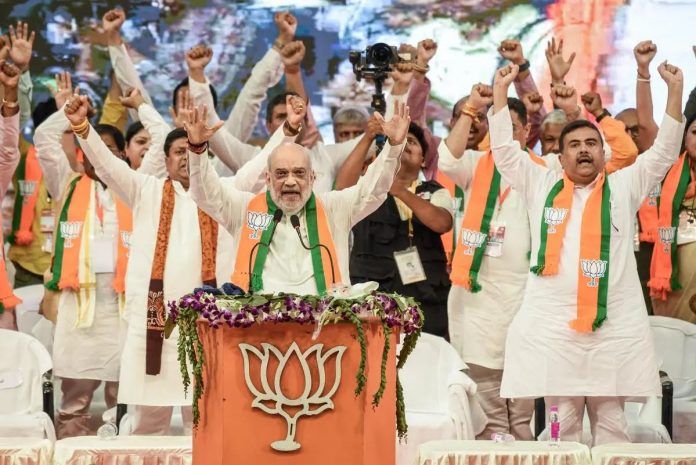New Delhi — As the political narrative around Operation Sindoor intensifies, members of India’s Muslim community are once again finding themselves at the receiving end of baseless accusations and harmful stereotypes, driven by the ruling Bharatiya Janata Party’s (BJP) majoritarian rhetoric, say critics and civil society voices.
Union Home Minister Amit Shah recently alleged during a rally in Kolkata that West Bengal Chief Minister Mamata Banerjee opposed Operation Sindoor to “appease Muslims,” despite no such stance being taken by her party, the Trinamool Congress (TMC). Political observers and minority rights activists have condemned the statement as factually incorrect and deeply communal.
“This kind of targeted rhetoric does more than just misrepresent facts,” says a senior Muslim academician, Delhi University Professor Apoorvanand , in his recent article published in the Frontline.“It criminalises an entire community by insinuating that Muslims are inherently anti-national — a dangerous narrative that has no place in a democracy.”
Contrary to these claims, Muslim citizens across India have always stood with the country during moments of national crisis. From serving in the armed forces to contributing to public service, education, science, and healthcare, India’s Muslims have consistently played a vital role in nation-building.
The Home Minister’s remarks, critics argue, are not only misleading but are part of a broader pattern where Muslims are routinely used as political scapegoats. The naming of a military action as “Operation Sindoor”—a term with Hindu religious significance—has raised further concerns over the state increasingly blurring the line between religion and governance.
“What we are witnessing is a systematic campaign to other Muslims,” said a retired Muslim bureaucrat. “This is not about national security; this is about using patriotism as a political weapon.”
Ironically, while Amit Shah attacked TMC at home, Mamata Banerjee’s nephew Abhishek Banerjee, a TMC MP, was abroad defending the very same operation. This clear contradiction, analysts say, reveals how the BJP is more interested in polarising the domestic electorate than pursuing genuine national unity.
Even more troubling, Muslim members of the armed forces and administration have served with distinction in the very operations now being politicised. A Muslim woman officer was reportedly among those who represented the armed forces during the official briefings — a fact ignored by those pushing the narrative that Muslims are against such operations.
The Muslim community has also expressed hurt and outrage at being repeatedly asked to “prove” their patriotism. “Why must Muslims constantly declare their loyalty to the country?” asked a young Muslim student from Delhi University. “Is our love for India not self-evident in our everyday lives, our service, our sacrifices?”
Security experts like Pravin Sawhney and Ajai Sahni have raised critical concerns about Operation Sindoor’s execution, urging for a more nuanced national conversation. Yet the ruling party continues to dismiss legitimate criticism as unpatriotic — especially when it comes from Muslims or opposition parties.
Meanwhile, opposition leaders, including Congress’s Salman Khurshid, have faced backlash for statements that appear to support the BJP’s line on Kashmir. Critics argue that Khurshid’s claims that Kashmiris are “happy” post-Article 370 abrogation are misleading and deny the harsh realities on the ground, particularly for Kashmiri Muslims who feel silenced and marginalised.
The BJP’s campaign of Tiranga Yatras (flag marches), supposedly to celebrate Operation Sindoor, is being viewed by many as an attempt to boost the party’s image rather than honour the military’s professionalism. “The real show of patriotism would be to stand by all Indians equally — including Muslims,” said a political analyst.
To brand Indian Muslims as disloyal or oppositional simply for political gain is not only unjust — it undermines the very idea of India as a secular, pluralistic democracy. The community’s demand is simple: Stop using their identity as a tool in political warfare.
“Being Muslim should never be a reason to question one’s Indianness,” said a Hyderabad-based scholar. “We have bled for this land. We have prayed for it. And we will continue to build it — with or without your approval.”




